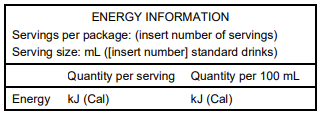On 13 August, changes to the Australia New Zealand Food Standards Code (the Code) were gazetted to mandate energy labelling on packaged alcoholic beverages.
What's changing?
- New labelling requirement: Most alcoholic beverages must display energy content information, known as an energy statement.
- Standardised energy statement: The statement must include energy content per serving, energy content per 100 mL, number of servings per package, the serving size and number of standard drinks per serving.
- Nutrition information panel (NIP): A NIP can be used instead of an energy statement, but must show the number of standard drinks per serving if there’s more than one serve.
What’s not changing?
- Claim requirements: Existing NIP requirements remain if nutrition content or health claims are made.
- Existing labelling requirements: Total standard drinks and alcohol content must still be displayed elsewhere on the label, as required by the Code.
- Exemptions: Energy labelling is not required for:
- small packages (less than 100 cm²)
- beverages already displaying a NIP
- beverages exempt from general labelling requirements.
- Transition period: From the date of gazettal, businesses have 3 years to comply with the new requirements.
Why this matters:
- Supports informed choice: Providing consistent and meaningful energy information helps consumers make informed choices.
- Protects public health and safety: Alcoholic beverages can contribute significantly to dietary energy intake. Clear labelling supports broader public health efforts.
- Improves clarity: A consistent format helps make energy content easier to find and understand.
- Provides certainty: Clear requirements and a three-year transition period support effective and practical implementation.
Consultation and assessment
FSANZ prepared Proposal P1059 to consider whether energy content labelling should be mandatory for alcoholic beverages. The proposal was assessed under the general procedure in the FSANZ Act. FSANZ undertook 1 round of public consultation in January 2023. Feedback from this process, along with additional targeted consultation with stakeholders, informed our final proposal and the Board’s decision.
In developing the energy statement, FSANZ had regard to the best available evidence, data on obesity prevalence and alcohol consumption, consumer research and testing, relevant ministerial policy guidelines, international approaches, analysis of costs and benefits and input from both public and targeted consultations.
Read our full assessment and the approved changes:
View the consultation paper (pdf 728 kb) and submissions (zip 40.4 mb)

